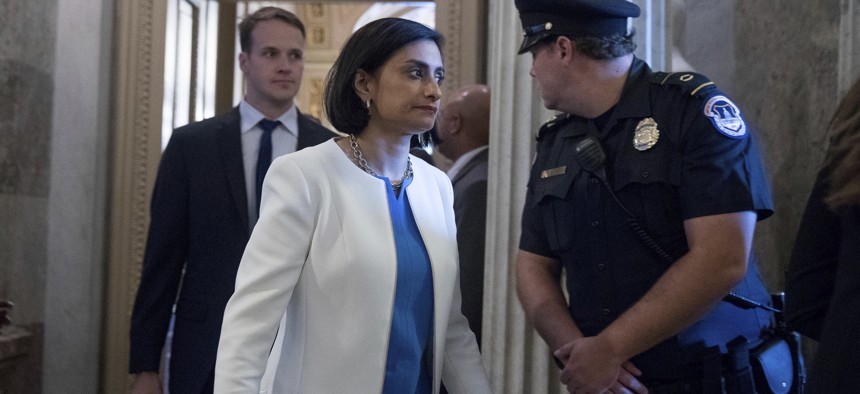Emergency CHIP Funds for States Are Nearly Halfway Gone

Seema Verma, Administrator of the Centers for Medicare and Medicaid Services. (AP Photo/Andrew Harnik)
States may not be able to count on reallocated money from the Centers for Medicare and Medicaid Services for much longer.
From October to December, the federal Centers for Medicare and Medicaid Services doled out nearly $1.2 billion to 17 states—including the District of Columbia—and four commonwealths and territories to help those jurisdictions keep their Children’s Health Insurance Programs afloat.
The CHIP program has been in limbo since Congress allowed its funding to expire on Sept. 30. For the states that have received it, the CMS funding reallocation is a temporary fix to their CHIP budget woes—Virginia officials acknowledge, for instance, that even if they were to receive the $32 million they have requested, that would only stave off CHIP’s shutdown until Jan. 31.
According to a Nov. 9 memo sent by CMS, the total projected funding available for redistribution came in at just under $3 billion. That means states are nearly halfway to exhausting these emergency dollars.

In late November, Colorado became the first state to send out a letter warning beneficiaries that they would lose their CHIP coverage at the end of January if Congress fails to act. State officials in Virginia are weighing sending a very similar correspondence.
Oregon and Minnesota are both keeping their CHIP programs running by using state resource to make up for budgetary shortfalls. Minnesota officials have not said just how much of the state's own money has been spent on keeping CHIP alive. Oregon Gov. Kate Brown has committed to spending $35 million in state funds to stave off a shutdown through December.
On Capitol Hill, lawmakers are still up in the air not about whether CHIP should be funded, but how the program should be funded. To the dismay of Democrats in the House of Representatives and local public health officials, the House CHIP bill, which passed on Nov. 3, offset the program’s funding in part by slashing money from the Affordable Care Act’s preventative health fund, charging wealthier Medicare beneficiaries higher premiums and shortening the grace period for ACA enrollees who fall behind on their monthly payments. The Senate has not yet determined how its CHIP bill would be paid for.
Quinn Libson is a Staff Correspondent for Government Executive’s Route Fifty, based in Washington, D.C.
NEXT STORY: Federal Housing Officials Emphasize Local Solutions to Increasing Homelessness






